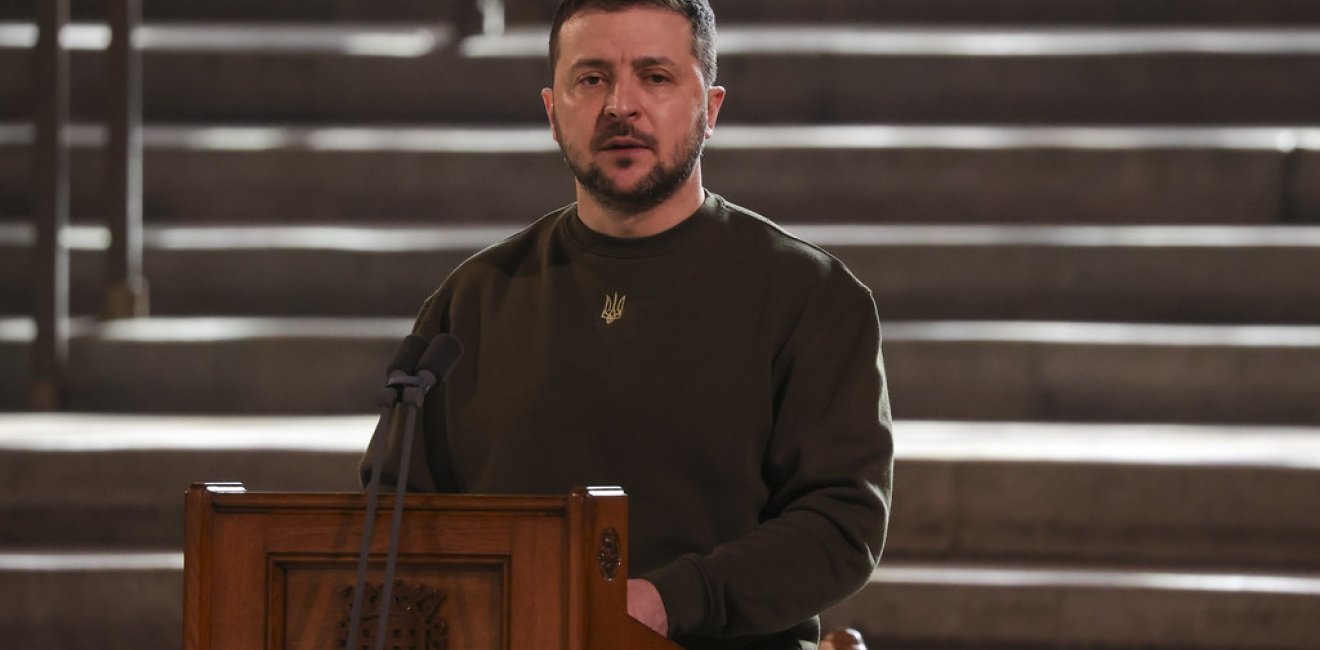One year after Russia’s brutal invasion of Ukraine, nobody has any idea how the war will end or how long Vladimir Putin will remain in power. Ukraine may ultimately be able to push Russian forces out of its territory. Russia may hunker down and consolidate its occupation of Crimea and the Donbas region. Or a grudging ceasefire may be negotiated to halt the carnage. Regardless of the eventual outcome, there is no question that the continent’s bloodiest conflict since 1945 will dramatically alter the future course of Europe. Even as the brutal fighting in eastern Ukraine drags on, it is time for the United States and its allies to peer beyond the horizon of the current fighting in Ukraine to examine how the war could shift the geopolitical contours of Europe, transform the foundations of the transatlantic partnership, potentially hasten regime change in Moscow, and trigger a new stage in major power rivalries among the United States, China and Russia.
Once the shooting stops, the hard diplomatic work will begin. An end to the war in Ukraine will test the ingenuity of Western governments in ways not seen since the Marshall Plan. The complicated mission of restoring peace and stability in Europe will require a show of Western resolve and unity among Western diplomats and politicians that may seem implausible in our age of political polarization. But just as the Truman administration summoned the energy and imagination to rally the West to rebuild a broken continent and repel Soviet hegemonic designs, the United States and Europe will need to muster the will and resources to address a daunting array of challenges that will emerge once a ceasefire takes hold in Ukraine. Ukraine now estimates it will require as much as $380 billion in reconstruction funding once the war is over, which is more than twice its annual gross national product. It is hard to see how the outside world will come up with that amount of money. While the United States may want to shift its focus to the Indo-Pacific region and deal with perceived threats from China, it is already clear that the European continent will command its attention for years if not decades to come.
The first priority in the war’s aftermath will be to rebuild Ukraine’s economy as well as its fragile democratic institutions, which will require close supervision to prevent the rampant corruption that plagued Ukraine in the past. How can Ukraine best be incorporated into the Western family of nations? Is early membership in the European Union and/or NATO feasible or sensible? At the same time, the United States and its Western allies will need to construct an entirely new relationship with postwar Russia. It is not in the long-term interest of the West to see Russia become ensconced as the junior partner of China in a duopoly of autocracies. But it also is hard to conceive how a reconciliation with Russia could ever occur if Putin and his kleptocracy maintain their grip on power.
A new ruling team in Russia could open the door to revived economic partnership with the West that can stabilize the world’s largest country, which stretches across nine time zones and contains vast mineral resources. The fate of Russia’s leadership will undoubtedly be shaped by the war’s denouement, by simmering power struggles within the Kremlin and the Russian military, and by the vehemence of popular hostility against Putin’s monumental strategic blunders. While Putin may appear unassailable after 22 years in power, like many previous autocrats once deemed invincible his eventual demise could happen with surprising speed, especially if the miserable performance of Russia’s military forces ends in humiliation. Much will depend on whether Western military support for Ukraine can be rapidly upgraded with the delivery of tanks, heavy armor, long-range powerful artillery and advanced air defenses that could enable Ukrainian forces to decisively turn the tide of the war in their favor.
In any event, Europe will need to consider whether it makes sense to resurrect a cooperative energy partnership with Russia by restoring the flow of oil, gas and precious minerals to the West. There is a lot of economic logic to doing so, but the emotional resentment against Putin’s war may inhibit any early economic truce with the West. Some nations may feel there is no alternative. Much of Germany’s prosperity was fueled with cheap natural gas supplies from Russia, which gave a strong competitive edge to its chemical and automotive industries in export markets around the world. That economic model has crumbled since Russia retaliated against Western sanctions by cutting oil and gas supplies to the West. Many Germans now fear they are entering a phase of de-industrialization at a time when some of their most powerful companies are moving investments abroad, their population is growing old and their vaunted productivity is shrinking. Another year of wartime hardship resulting from a shortage of Russian gas and dwindling export markets may well turn German public opinion back in favor of a renewed energy partnership with Moscow.
Other EU member states will be extremely wary about returning to a time when Russia was the key provider of raw materials for the European economic engine. Indeed, the future task of rebuilding peaceful and stable relations with Ukraine and Russia will also change power dynamics within the European Union. Eastern members such as Poland and the Baltic states will assume a much higher profile in maintaining security in their neighborhood, while the traditional power tandem of France and Germany is likely to become much less influential. As a result, the eastern states may seek to use security leverage in their neighborhood to veto any early rapprochement with Russia.
The devastation in Ukraine coincides with the rise of other factors that are reshaping global affairs, notably the accelerating impact of climate change and disruptive demographic trends that could soon magnify immigration crises in Europe and North America. Along Europe’s northern and southern frontiers, fresh challenges are rising because of the growing impact of climate change and surging refugee populations. The melting of the polar ice cap has opened new navigation routes and shaved up to seven days of shipping time between Asia and Europe. As competition heats up for control over the Arctic region, Europe will need to defend its commercial interests there against encroachment by Russia and China. The prospective inclusion of Finland and Sweden as members of NATO will greatly improve Europe’s capacity to defend the northern periphery.
In the south, President Emmanuel Macron of France has warned that Europe in the coming years faces a possible tsunami of refugees and asylum seekers fleeing drought, famine and civil war in Africa and the Middle East. In an interview for my book about him and his foreign policies, titled The Last President of Europe, Macron told me that he expects as many as 250 million people to flee Africa and the Middle East because of intolerable conditions in the decades to come. He said that fifty million people alone gain their daily sustenance from Lake Chad, which is forecast to evaporate within the next fifteen years. When that happens, Macron said, many of those people will head north and try to cross the Mediterranean into Europe. It will become a refugee crisis that will dwarf all others.
Finally, Europe and the United States will need to re-define their partnership for the next century. Once conflict dies down in Ukraine, the United States will want to focus its attention and resources on dealing with the China threat. Europe, which is reluctant to damage its lucrative commercial relations with China, is deeply skeptical about aligning too closely with the United States in any confrontation with China, including over Taiwan. Even if it wanted to do so, there is little that Europe could contribute to an Indo-Pacific security partnership. Only France, which maintains five bases and a robust navy in the region to protect nearly two million of its citizens living in Polynesia, possesses the capability to fortify a Western military coalition in the region. And if the United States urges its European allies to take greater responsibility for their own security while it focuses on China, it could exacerbate growing tensions among the Europeans about how best to ensure a new era of stability and security on their own continent. Poland and other eastern states, including Ukraine, desperately want to keep the United States engaged as their ultimate security guarantor, while France and Germany are urging their partners to take steps toward strategic independence by preparing for the possibility that America will abandon its leading role in the future defense of Europe.
When the war subsides, these security challenges in Europe will become starkly apparent. It is then that the United States may come to realize that pulling back from Europe, if only to pivot toward Asia and the threats posed by China, could be a perilous gamble that would undermine long-term stability in a part of the world that served as the theater for two destructive global wars in the past century. The United States should have learned that lesson after the first world war, when its retreat into isolationism and disavowal of international responsibilities fomented the rise of Hitler, Mussolini and other destructive fascist forces. History may not repeat itself, but in Europe there are powerful reminders that phases of benign neglect indulged by the world’s leading superpower can quickly lead to disaster.






